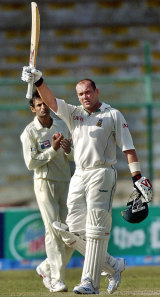South African batsmen get their house in order
Win the toss, bat first, top order fires, score big; as first-day plans go, it is hardly out of the box, but when it comes off, down to the last letter as it did today for South Africa, tried, trusted and tested will do
01-Oct-2007
|
|

|
Win the toss, bat first, top order fires, score big; as first-day plans go, it is hardly out of the box, but when it comes off, down to the last letter as it did today for South Africa, tried, trusted and tested will do.
Though South Africa's top order is by no means flimsy, it suffers from strange ailments. They have struggled like Pakistan, for example, to get their opening right, so much so that Graeme Smith has played with six different partners in his career.
As an illustration of the troubles, South Africa's openers on average have put together less than 29 runs in their last 15 Tests, which is less even than Pakistan. So Smith returned to his first, most successful partnership - with Herschelle Gibbs - and so too did the runs. The two duly put on 87, and their side was away.
The other issue their batting has had has been the inability to score hundreds; Smith last scored one 15 Tests ago, Gibbs 22 Tests ago and AB de Villiers 17. They're lucky then to have Jacques Kallis, who chalks one up roughly every four Tests, though even this hundred - his 25th Test century - came ten Tests after his last.
But this didn't much resemble the 24 that preceded it, for it was his quickest (off 147 balls) wherein lies much of its beauty. It was constructed essentially on Kallis-ian traits: the high-elbowed drives, the ramrod-straight-backed punches square off the back foot and a defence through which atoms struggle to pass. Only it seemed to be done with a pinch of amphetamine, so purposeful and hurried did he look.
Singles came easily, speedily even, and he went hunting for boundaries, where he often waits for them. By day's end, he was even swishing wildly, carelessly at the faster bowlers, connecting with air and leather equally.
Was this a statement of sorts, in response to his dropping from the Twenty20 squad? Perhaps just a timely retort to those who take his strike rate, embellish it with talk of bubbles (rarely is focusing on your survival in Tests a bad thing) and detract from his status as a batsman? Kallis is unlikely to say and it's probably not important in the broader scheme of things.
Hashim Amla partnered him through nearly three hours, though for most of it only Kallis appeared to be batting at both ends. Of the 294 balls they negotiated together, Kallis faced 165 but it seemed many more; Amla went to tea on 49, but got to his fifty in the eighth over after it and it wasn't because he dawdled; Kallis allowed him - and that is the word - only 11 deliveries in that period.
|
|
It wasn't as if he was farming the strike, or shielding Amla who was coping just fine himself, thank you very much. Kallis just seemed ravenous for it, demanding the strike and making full use of it too. "We were quite even until tea," said Amla later, "but after it, he took up the attack quite beautifully. He is the kind of player who can do that quite easily."
He is also the kind of player who should have a double century or three to his name: remarkable to think, for all his skill, for all his powers of concentration that he is the only one of 17 with 23 or more hundreds to have not scored a double. He is perfectly placed to correct that anomaly.
Of course, it is cricket's way that he shouldn't have been unbeaten at all. Pakistan welcomed Shoaib Malik to the Test captaincy in the worst way, dropping Kallis twice (on 36 and 61), Amla once and missing a chance to run him out later.
It exacerbated a tough first day at the office. The ploy to field four spinners will be questioned, especially as Mohammad Hafeez, one of two part-timers, bowled more overs and had more success than one of the specialists, Abdur Rehman.
Stacking your side with spinners on turners is hardly the Pakistani way of doing things, despite what Malik thought before the match. But in fairness, the ploy was possibly conceived with batting first in mind, for as Amla warned, the pitch is already crumbling and will get no better as the Test progresses. And that places Kallis's efforts, if it was at all needed, in a better light still.
Osman Samiuddin is the Pakistan editor of Cricinfo